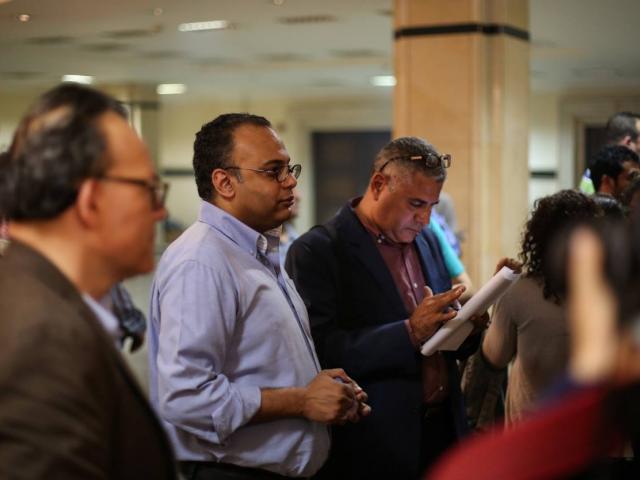
The Egyptian Initiative for Personal Rights is formally Investigated in the Case Against Civil Society Organizations
Press Release
Investigative judges this month formally started investigating the Egyptian Initiative for Personal Rights as part of Case No 173/2011, the criminal investigation human rights organizations which was the basis for the asset freeze request and the travel ban of the organization’s founder Hossam Bahgat.
On July 17, the investigative judge Ahmed Abd al-Tawwab summoned the organization’s financial officer for interrogation. This is the second summons in connection with EIPR, after a former manager was questioned on July 3.
On the same day, the North Cairo Court again adjourned consideration of the asset freeze order for Bahgat and directors and staff of other rights organizations to August 15, 2016. Hossam Bahgat has been banned from travel since February 2016, in his capacity as the founder of the EIPR, and the North Cairo Court is considering a freeze of his assets despite the fact that he has thus far not been informed of any formal charges against him.
The Egyptian Initiative for Personal Rights believes that these measures amount to a government assault not only on civil society organizations working in defense of human rights but on all democratic, voluntary forums and activity in society. These latest measures pose an unprecedented threat to the operation of these organizations and their work to defend basic human rights guaranteed in the constitution or as part of the Egyptian government’s international obligations.
In receiving formal summons to interrogation, the EIPR joins Nazra for Feminist Studies, the Arabic Network for Human Rights Information (ANRHI), the Hisham Mubarak Law Center, the Cairo Institute for Human Rights Studies (CIHRS), and other groups currently being investigated. Defendants in the case may face charges under Articles 78, 98(c), and 98(d) of the Penal Code, which carry a maximum sentence of life imprisonment and criminalize the receipt of funds or “other things” on vague grounds such as “disturbing the public peace.” They may also face charges under Law 84/2002 regulating civic associations in Egypt, whose flawed provisions violate the current constitution, which explicitly provides for the freedom to form civic associations in Article 75.
The EIPR operates legally as a limited liability company registered with the General Authority for Investment and is subject to and complies with tax, labor, and social insurance laws.
Over the past months, the media has increasingly carried official statements regarding the reopening of case 173/2011, after which an attempt was made to shut down the Nadeem Center for the Rehabilitation of the Victims of Violence and Torture. Gamal Eid was then banned from travel, followed by Hossam Bahgat in February and Mohamed Zaree, Mozn Hassan, and Nasser Amin in June and July. Finally, applications to freeze the accounts of the directors and founders of several institutions were filed, including the EIPR, ANRHI, CIHRS, and the Hisham Mubarak Law Center, and staff members at these organizations were summoned for questioning. These measures were accompanied by an orchestrated smear campaign in which government officials claim that these groups are operating in violation of Egyptian law, which the organizations have denied in the strongest terms on more than one occasion. These organizations are either registered as civic associations under Law 84/2002, limited liability companies, law firms, or clinics, and they all comply with their legal tax and insurance obligations.
The Egyptian government has repeatedly pledged in more than one international forum to amend the Associations Law to make it consistent with the provisions of the constitution adopted in January 2014 and to comply with its international obligations. The most recent pledge was made by the Egyptian government before the UN Human Rights Council during Egypt’s Universal Periodic Review in March 2014, when it stated its intention to review the law and cooperate with civil society organizations to draft a new law. Human rights groups have engaged with more than one government committee tasked with drafting a new Associations Law, the last one in 2013, and they have repeatedly appealed to the Egyptian government to engage in a serious dialogue with the aim of clarifying any official concerns and facilitating the work of civil society as a whole.
For more background on the case, see: Background on Case No. 173 - the “foreign funding case” Imminent Risk of Prosecution and Closure



